12 Health Benefits of Kiwi Fruit For A Healthy Life

This post may contain affiliate links. If you make a purchase through links on our site, we may earn a commission.
One major fact about kiwi is it has almost three times the amount of vitamin C as compared to oranges, which plays a vital role in boosting immunity. Further, the fruit got its name due to its resemblance to New Zealand's national bird, Kiwi.
You may be wondering what's so great about Kiwi fruit and why people boast about its benefits. How much can you consume on a daily basis? Is it good for health and skin? Continue reading this article to clear all your doubts and know more about your favorite kiwi fruit.
What Is Kiwi?
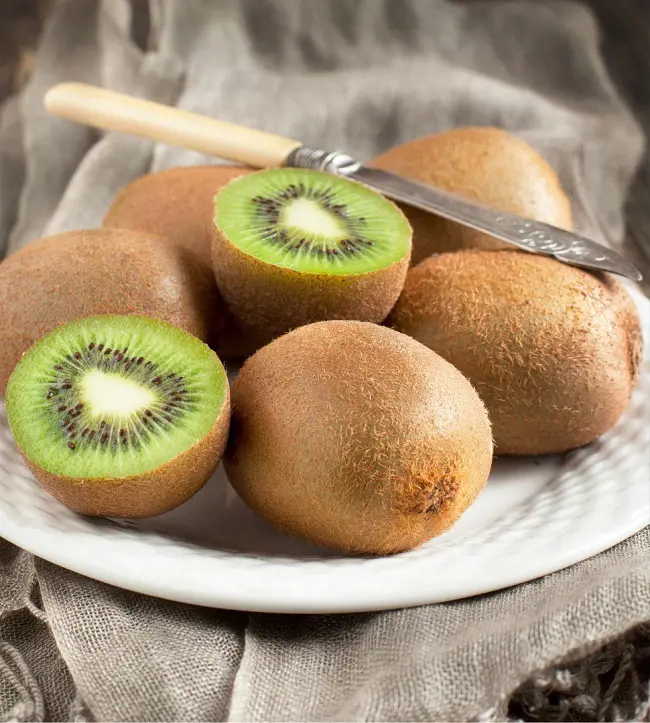
Kiwis, popularly known as kiwifruit, are generally classified as berries called Actindia deliciosa. They are oval in shape and about the size of the chicken egg. This fruit has fuzzy brown skin along with green flesh and tiny black seeds that are safe for consumption.
Originated from China but gained commercial popularity from New Zealand, this fruit is an absolute superfood that is worth adding to your everyday diet. Placed under the category of nutritional exotic fruits, it often features as a topping in several dishes including fruit bowls, salads, and smoothies.
How Does It Taste?
Kiwis taste sweet, and tangy, along with refreshing and strong flavor which makes it distinctive and preferably consumed raw. When you take your first bite into a soft slice of kiwifruit, you will experience juicy fruit juice with its refreshing quality.
Unripe kiwi has a strong tartness, so if you consume it too soon, it could remind you of other citrus fruits. Some also believe it tastes similar to pineapple as well as dragon fruit with a little more tart. However, the taste of this fruit varies depending on the type.
Nutritional Value Of Kiwi Fruit
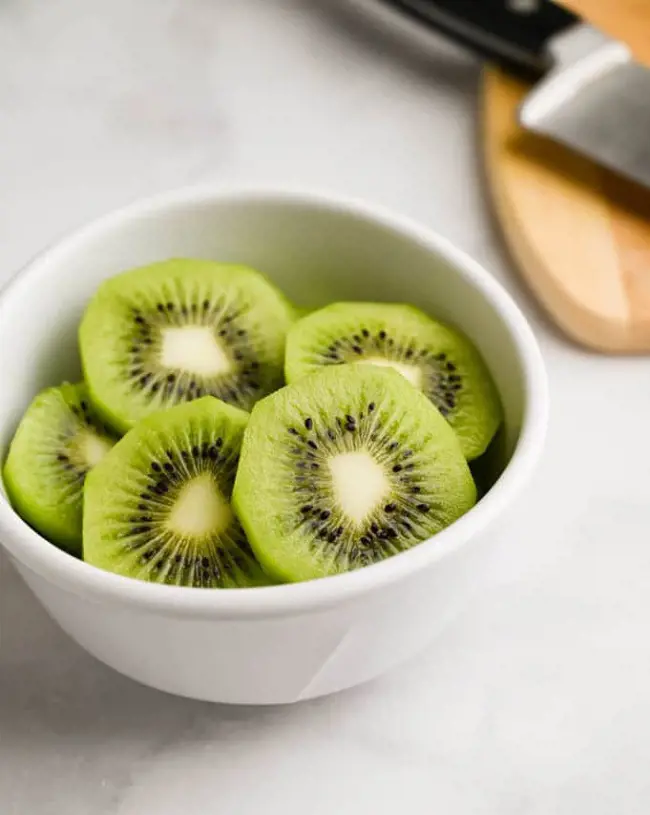
These exotic Kiwis have an impressive nutrient profile. They provide a good source of dietary fiber, are low in calorie, and is known as an excellent vitamin C source. Let's take a look at the breakdown of the macro and micronutrients present in kiwis.
Per 100 grams (3.5 ounces) of serving contains:
- Calories: 64
- Carbohydrates:14 grams
- Fiber: 3 grams
- Fat: 0.44 grams
- Protein: 1 grams
- Vitamin C: 83% of the Daily Value (DV)
- Vitamin E: 9% of the DV
- Vitamin K: 34% of the DV
- Folate: 7% of the DV
- Copper: 15% of the DV
- Potassium: 4% of the DV
- Magnesium: 4% of the DV
Different Types Of Kiwi Fruit

This fuzzy green fruit basically contains five main types. Further, these five types of fruits are again subdivided into more than 50 types of kiwifruit that are available around the globe.
- Green Kiwi
These are the most common types of kiwi that are available worldwide. It has fuzzy brown skin and vibrant green edible flesh. It is a perfect balance of sweetness and sour taste. Extremely rich in vitamins K, E, and C, antioxidants, and dietary fiber.
- Gold Kiwi
Gold kiwi has a smooth, bronze exterior with a bright gold-colored flesh interior. They are sweeter and less acidic as compared to green kiwis with a tropical mango-like flavor. This fruit is rich in vitamin C more than green kiwi.
- Red Kiwi
This particular variant of kiwi is rare and made of smooth, bronze skin, which is similar to the gold kiwi but contains red or deep orange flesh. They are a combination of tart and sweet and packed with vitamins and antioxidants.
- Baby Kiwi
Also known as kiwi berries, they are significantly smaller than regular kiwis. They come in the size of grapes along with smooth, edible skin, and can be eaten whole with skin. They are rich in vitamins and minerals, including vitamins C, and K, and dietary fiber.
- Arctic Kiwi
Artic Kiwi is also smaller than regular kiwi, similar to kiwi berries. It features smooth and edible skin and is also known for its cold hardiness. Tastes sweet and tangy, and it offers a similar nutritional profile to the common kiwis.
1. Rich In Antioxidants
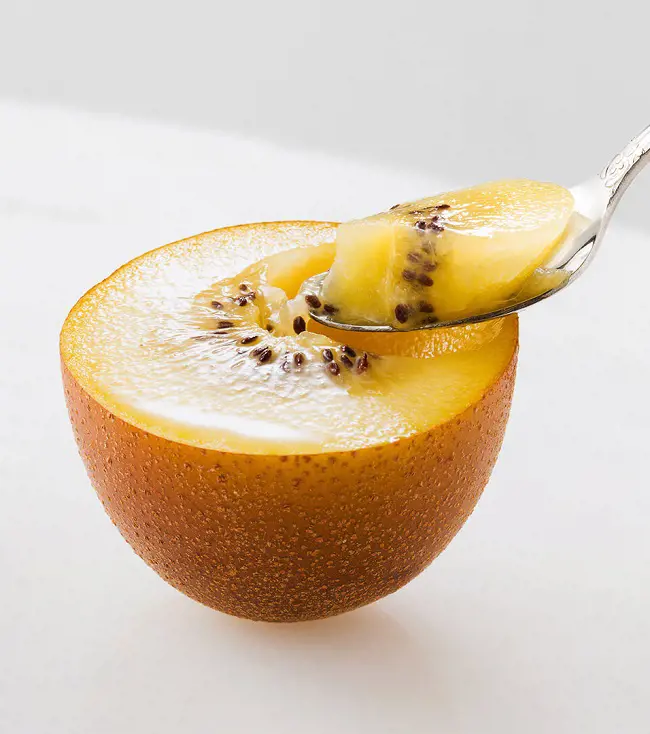
Kiwis are super rich in nutrients and phytochemicals which contain antioxidant properties. According to USDA, 100 grams of kiwis offer 92.7 mg of vitamin C which is more than lemon and oranges. Vitamin C helps protect the cells from oxidative damage and plays a more important role in the functioning of the body.
Several studies show that consuming kiwi can assist you to reach optimal blood levels of vitamin C and maintaining the level is critical to an immune system called neutrophils. Eating a kiwi daily, therefore can provide you with enough antioxidants that help boost immunity, prevent free radical damage, and reduce inflammation.
2. Maintain Digestive Health

Kiwi fruits are an excellent source of both soluble and insoluble fiber. The soluble fiber present in kiwis helps to regulate blood sugar and support healthy gut bacteria. Similarly, the insoluble fiber can help to keep bowel movements regular.
Interestingly, the fiber in this fruit can retain water which means it is a good choice for improving stool regularity and decreasing the time it takes for food to go through your digestive system. Because of these qualities, several studies have backed that kiwis can be a good fruit choice for people suffering from constipation problems.
3. Contribute To Healthful Skin

As kiwis are known for their antioxidant properties as well as their active role in producing collagen, this fruit can be especially beneficial for maintaining healthy skin. The regular consumption of kiwis is linked to improving skin elasticity, texture, and complexion.
Vitamin C present in kiwis supports skin by promoting collagen gene expression and also by reducing the pathways that promote dark spots. It also reduces the oxidative stress that can adversely damage the skin and enhances the body's capacity to quickly recover from injuries. This vibrant-looking fruit also has anti-inflammatory properties that help lowering sebum production in pores.
4. Improve Quality Of Sleep

In recent years, there has been a rise in cases of insomnia and sleep disorders due to increased stress and poor lifestyle of individuals. A 2011 study researched the effects of kiwifruit on sleeping quality in adult and their sleep problem. They found that eating kiwis help them with better sleep pattern.
The antioxidant and serotonin contents of kiwis benefit their quality of sleep. Serotonin is a neurotransmitter that's the predecessor to melatonin, the main hormone that helps with maintaining healthy sleep patterns. So, the experts have suggested consuming kiwi fruit one hour before bedtime to improve overall sleeping quality, and also have the ability to fall asleep more quickly.
5. Support Heart Health And Blood Pressure

These nutrient-dense fruits contain antioxidants, fiber, and potassium, which are all linked with good heart health. Potassium intake is highly encouraged by the American Heart Association (AHA) which helps to relax the blood vessels and manage blood pressure.
One kiwi fruit contains about 215 mg of potassium which fulfills nearly 5 percent of the daily requirement. The fiber found in kiwi may also aid in cardiovascular health and dietary fiber aids the heart by lowering triglycerides. Therefore, adding kiwi to the everyday diet can be beneficial as it reduces blood pressure levels and decreases the risk of stroke or heart attack.
6. Excellent Source Of Plant Compounds
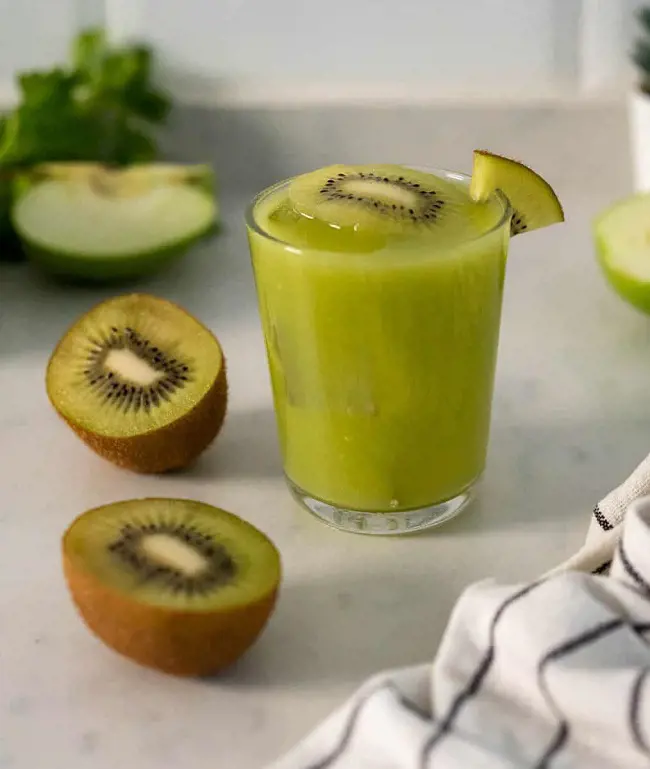
Kiwis are an excellent source of plant compound that provides antioxidant as well as anti-inflammatory effects in the body. They are high in carotenoids, which have health-promoting properties as well and their active compound includes lutein, zeaxanthin, and beta-carotene.
Various studies have proven that diets high in carotenoids may protect against certain health conditions. This superfruit also contains polyphenol compounds such as caffeic acid and chlorogenic acid, which provide anti-inflammatory effects in the gut and improve overall health conditions.
7. Protects From Cancer Generating Cells

The free radicals present in the body can cause damage to DNA that can result in various types of cancer. However, some studies have suggested that Kiwis contain a range of antioxidants that may help remove free radicals from the body and ultimately help to prevent cancer.
In addition, according to research and studies, people who include plenty of fiber in their diets, especially from fruits and cereals are less prone to develop colorectal cancer. This small yet nutritious fruit also protects cell DNA from oxidative damage, which may cause cancer and reduce the risk of inflammation-related diseases.
8. Contribute To Ocular Health
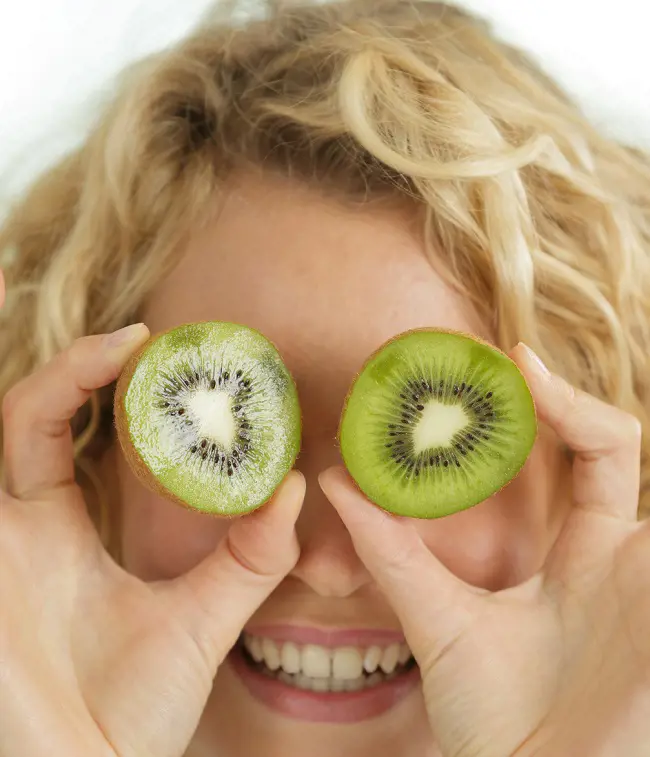
The high amounts of antioxidants, vitamin C, and carotenoids present in kiwis may aid in preventing eye diseases and promote overall ocular health. It also contains lutein, which can protect the eyes and decrease the risk of age-related vision loss according to the research.
A cup of kiwi also contains roughly 20 percent of your daily recommended copper, which is an important mineral to function nervous system. The nervous system plays a crucial role in the overall health of the retina, which is responsible for converting into electrical impulses that our brain reads.
9. Promotes Healthy Weight Loss

Several studies have shown that high fiber intake can help reduce long-term weight gain by balancing the gut microbiome. This can also help to reduce the risk of health problems related to obesity, including heart disease and diabetes.
Additionally, kiwi fruit contains low calories, and adding them to your daily diet can provide you with numerous health benefits without adding to your weight. Fiber increases the feeling of fullness, which helps you from overeating and you can also control your junk craving by consuming kiwi and effectively drop those extra pounds from your body.
10. Lower Blood Clot Risk

Kiwi fruits not only manage blood pressure but also actually reduce blood clotting. A blood clot is a gel-like mass formed by platelets and fibrin in the blood and when they inappropriately stay inside an artery or vein, they may cause a heart attack or stroke as blood flow past the clot is decreased.
Consuming two to three kiwis a day can significantly lower the risk of blood clotting according to a study from the University of Oslo. Kiwis thin the blood reduces the clot and lower fat that can cause blockages in your arteries without affecting cholesterol levels. Their effects are similar the the daily dosage of aspirin recommended by doctors to improve heart health.
11. Improves Bones Health

Kiwi fruit is an excellent source of vitamin K and has traces of calcium and phosphorus, both of which are important for bone health. Vitamin K is majorly known for keeping bones strong and lowering the risk of osteoporosis and also may prevent coronary artery disease.
One regular kiwi contains 31 mg of vitamin K, which is about 25 percent to 30 percent of the adequate intake for most adults. If you don't get the required amount of vitamin K, your bones get weaker and more prone to getting bone diseases and weaken them.
12. Aid Asthma Treatment

Kiwi, the vibrant green fruit is rich in antioxidants and contains an excellent source of vitamin C. Therefore consuming kiwi daily will help improve lung problems and bring down asthma symptoms such as coughing, shortness of breath, chest pain, etc.
This is especially effective for kids, who can take great benefit from eating this superfruit. In one study, regular intake of kiwifruit was found to have a great effect on children with wheezing and asthma. Also, vitamin C helps to reduce inflammation which is a common issue in respiratory disorders by fortifying the capillary walls. So, it is beneficial to consume more than once or twice a week for better results.
Ways To Consume Kiwi Fruit

Majority of the people love to enjoy eating kiwis raw and adding them to fruit salads which can give them the taste of both sweet and savory. Also, the regular kiwi needs to be peeled before eating. However, some varieties can be eaten without the outer peeling.
Here are a few ways to incorporate kiwis into your daily diet:
- Add to your favorite salads to create a nutrient-dense breakfast.
- Blend kiwi into smoothies along with other fruits.
- Pair with Greek yogurt for a light, refreshing, and healthy dessert.
- Add kiwi to make protein shakes.
- Can also be eaten fresh, dried, or frozen and can be used as jam base.
- Kiwi Juice is also added to meat to make it tender
Potential Risk
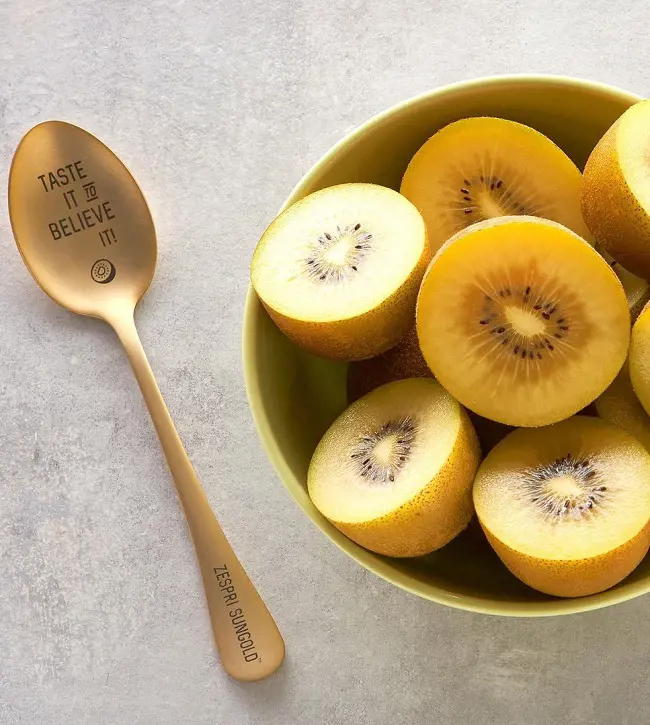
Eating kiwis on a regular basis is extremely beneficial for health and does not have negative side effects for most people. However, people who are allergic to certain kinds of food should consult their physician as it contains many potential allergens such as actinidin.
Kiwis can cause allergic reactions, particularly in children and some signs of kiwi allergy include:
- Swollen Tongue, Face or Throat
- Trouble Swallowing and Breathing
- Itchy Throat
- Wheezing
- Abdominal Pain
- Hives
- Nausea and Vomiting
- Skin Rash
If you experience these symptoms after consuming kiwi then immediately contact emergency services otherwise, it can lead to severe health problems. Similarly, if you are under prescribed blood pressure medication then be aware that consuming too much of this fruit may cause side effects.
Recent posts
Nutrition
Nutrition
Liquorice Root: Benefits And Uses
You can spell it liquorice or licorice; this herb or root has been in use for centuries in most medicinal applications, as a natural sweetener and to enhance flavors. Regarding its origins, it comes from the root of the "Glycyrrhiza galbre" plant and...
Nutrition
Is Ramen Healthy? Here's What Dietician Says
Ramen is a traditional dish from Japan that in the recent era has become a global phenomenon. This beloved and comforting soupy dish however has been questioned, when it comes to its nutrition. Best for those looking for a quick (instant), affo...
Nutrition
Is Wheat Bread Healthy? An Expert Picks
Wheat bread has been proudly celebrated as a dietary staple in countless homes for as long as people can remember. It has earned a reputation as a healthier alternative to white or any other processed bread, that no one can deny. Because of its evide...
Nutrition
Is Sausages Healthy? Nutrition And Health Benefits
Sausages are tasty in an addictive way, making them one of the most popular foods worldwide. You may have enjoyed this convenient food often, whether on a bun with mustard or grilled on a barbecue, the simple preparation methods are what makes its co...
Nutrition
Ice Cream Benefits: Nutrition, Potential Risks And Best Choices
Not gonna lie, ice cream is often taken as a guilty pleasure treat, a delightful treat that takes you to cloud nine but is frequently associated with negative health implications. Nonetheless, the happy news is when devoured mindfully, ice cream can ...
Nutrition
Is Sushi Healthy? Some Good and Bad Choices
Sushi is a wholesome meal and a beloved Japanese dish. The traditional sushi recipe is a simple combination of fresh fish, vegetables, and vinegared rice which is popular for its minimalistic preparation. As with any food, there are factors that dete...







